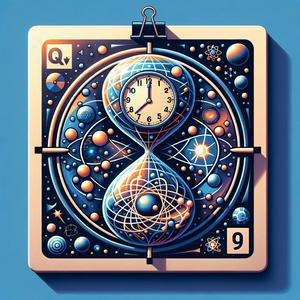Quantum for Everyone: Illuminating the Invisible | Breakthroughs from Bengaluru to Beyond
This is your Quantum Basics Weekly podcast.What a triumphant few days it’s been for quantum science. Anyone following the news will know that this week’s Symposium Celebrating the Quantum Century in Bengaluru wasn’t just a gathering—it was a declaration. A hundred years since quantum mechanics first cracked reality’s foundations, and today, the energy at the Indian Affairs Chancery Pavilion feels like Schrödinger’s cat, both a reflection of what’s known and a pulse of infinite possibility. For someone who’s spent decades mentoring students through their first Hadamard gates, guiding researchers on quantum error correction, and debugging circuits deep past midnight, the energy is electric, alive with debate and discovery. My name is Leo, your Learning Enhanced Operator—here to guide you through the quantum labyrinth on Quantum Basics Weekly.Let’s get straight to the action. One quantum resource released today that’s already shaking up how people learn: Quantum for Everyone—a free, multilingual global course now live, designed to democratize quantum literacy for learners of all backgrounds. Unlike traditional textbooks, it’s engineered for clarity, featuring interactive modules, bite-sized video lessons, certification pathways, and even neural network-powered practice problems. No more being lost in the math—now, visualizing qubits in superposition is as simple as watching a cloud of particles flicker across your screen, feeling for a moment the tension between certainty and possibility.Imagine the drama as students in Lagos, Mumbai, and São Paulo simultaneously simulate quantum entanglement, their computers humming with the distant echo of Planck’s constant. This platform makes quantum phenomena less a wall of symbols, more a living theater. The most powerful metaphors come alive: entanglement isn’t just an arcane physics problem—try to picture your social connections, each interaction twisting your personal state, instantaneously mirrored in remote nodes. Quantum learning as art, science, and story.At the Bengaluru symposium, Professor Matthew Rosseinsky of Liverpool unpacked a breakthrough in materials discovery using quantum computing. Picture a molecular simulation—classical computers slog through atomic positions, combinatorial chaos. Now, quantum approaches formulate these puzzles as QUBO problems, letting quantum logic calmly wrangle thousands of possibilities. It’s like choosing routes on an infinitely complex map—one moment you’re everywhere, the next you’re exactly where you need to be. These advances are not theory—they’re being deployed on experiments where quantum algorithms predict new crystal structures more efficiently than ever before.Alongside this, the SIESTA-QCOMP project demonstrated hybrid workflows for electronic structure calculations, connecting quantum and classical methods in tandem. Seeing science at this intersection feels like watching two waves intersect—emerging into new patterns neither could achieve alone.As quantum tools and resources grow more intuitive—like today’s Quantum for Everyone platform—the field steps closer to practical impact. Decades ago, quantum mechanics was a whisper of paradox; now, it’s an invitation to participate.Thank you for joining me in this whirlwind tour of breakthroughs, drama, and new beginnings. If you ever have questions or topics you want me to tackle on air, just email
[email protected]. Remember to subscribe to Quantum Basics Weekly, and this has been a Quiet Please Production. For more information, check out quietplease.ai. Until next time, may your states stay entangled, and your curiosity collapse only with answers.For more http://www.quietplease.aiGet the best deals https://amzn.to/3ODvOtaThis content was created in partnership and with the help of Artificial Intelligence AI


